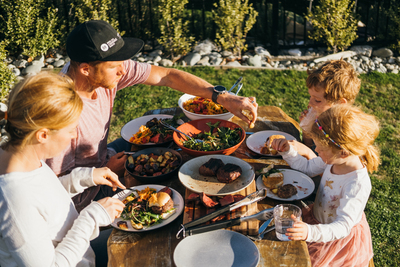When asked what athletes should consume immediately after training, I usually hear ‘protein shakes’ and ‘protein bars’ thrown around with most frequency. Of course, it's important to have an acute awareness of exercise breaking down muscle tissue and protein ingestion being required to repair said tissue as part of the recovery process.
But I'm surprised by the common omission of carbohydrates from the conversations around recovery food, especially given its importance to the endurance athlete in a general sense.
When I'm in a peak training phase or racing across consecutive days, I simply can't eat enough. With glycogen being a preferred fuel source for our bodies as the intensity of exercise increases, it quickly makes sense that we need to replace these stores with carbohydrate-rich foods in order to back-up with the next day of racing or training.
Why carbs are important for recovery
So while the majority of endurance athletes and coaches will agree that ingesting 60-90g of carbohydrates per hour during prolonged and moderate-to-high intensity exercise bouts is critical, I sense our approach to carbs after training and racing can be something of an afterthought.
The importance of post-exercise carb ingestion has been rammed home for me when I HAVEN'T nailed this aspect of nutrition. A classic example is when I've done a key training session in the morning, had a few hours off during the middle of the day, then gone to back it up with another key session in the afternoon, only to then bonk. Sound familiar?
Many of us will have day jobs and this presents challenges, especially when training for multiple and/or high volume sports where training at both ends of the day is common. I've found that the key to nailing my next session is usually getting the carbohydrates back in immediately following the current one.

For me, this can as simple as changing from an egg omelette and a protein bar or shake, to having those eggs on toast and adding bananas, berries and honey to the shake (way yummier too, right?).
You don't need to have a degree in exercise physiology to make sense of this equation: hard and/or prolonged exercise session ---> glycogen depletion (‘fuel’) ---> subsequent restock of glycogen (via carbohydrate rich foods such as above example) = better performance in following training session.
In recent years, scientific research has helped open our eyes to ‘Low energy availability (LEA) in sport’ (or RED-S) which is alarmingly common in high volume sports such as triathlon, rowing and swimming where energy expenditure is so high that we need to ingest large amounts of calories to stay healthy.
LEA can lead to very undesirable health challenges such as bone injuries, amenorrhea, compromised immunity and even heart health.
How to optimise post-exercise carb intake
In my personal experience, it becomes essential to find windows in my day to take in large quantities of calories (from all the main macronutrients, but certainly from carbohydrates especially) in order to function optimally as both a human and athlete (because you need to achieve the former if you want to achieve the latter).
One of the key windows I've identified for a big old feast, is the time immediately following key training sessions. We know from research that our body is primed to metabolise carbohydrates in the first few hours following exercise, but it also makes sense in practical terms as I am usually too buggered to be doing much else in this period, so it seems an opportune moment to be eating.
Some of my coached athletes have to rush from swim squad to work for example, but I just explain how important it is for them to be organised. One of them now whips up her smoothies (with all the trimmings including oats, maple syrup, milk, berries etc) and has it waiting in the car to be consumed on her drive from the pool to work.
Of course, one of the challenges for us endurance athletes is the fear of putting on weight. But my answer to this is multifaceted. First, the key to achieving a healthy body composition actually lies in our ability to train consistently. Given carbohydrates play such a major role in our immune system, injury prevention, sleep quality and exercise performance, we must see them as friend not foe as far as their role in helping us achieve a body we feel proud of.

Also, an athlete who trains and eats regularly is more likely to maintain a healthy and efficient metabolism (bonus: we burn more calories at rest!). So while I'm not a psychologist and can't claim to know how to unlock the code that improves your innate relationship with food, I do think it helps to consider the carbs in the context of what they help you do and achieve.
How much carb do you need?
If that doesn’t help, just remember legendary Olympic swimmer Michael Phelps was prolifically reported to consume 10,000-12,000 calories a day during his career (equivalent to around five ‘average’ men’s daily dietary intake). And I don’t know about you, but I certainly admired his physique. The moral of this story is, if you want to train hard and stay healthy, eat the food.
As a final example of where getting the carbohydrates in after exercise has helped me, I reflect on my days of stage-racing in China with my teammates. We’d race for 4-6 hours a day across kayaking, mountain biking and running for 3-5 days in a row. The intensity was generally very high and we’d always aim to hit the magic 60-90g carbs per hour during the racing itself.
Generally, we’d finish each day of racing in the early afternoon then get a bus back to our hotel to prepare for the next day. I would usually start feasting on a meal on the bus (usually a Radix dehydrated meal for convenience) and literally wouldn’t stop eating for the rest of the day through until bedtime.
Yes, we burned a huge amount of energy when racing on the red line for hours every day, but we also ate as if we were expecting a month long famine to follow! While other teams would have good days and bad, we’d usually be consistent and successful on every single day and I'm convinced it was no coincidence that we were also the team placing most emphasis on having food available from the moment we finished each day of racing.
In the week-long Tour of Southland road cycling event I did last November, we followed a similar process. After each day of racing we’d arrive back to the team motel and sink our teeth straight into a meal that usually included rice or pasta, perhaps even both. This would usually be mid-afternoon and sure enough by dinner time only a few hours later we’d be hooking into another carbohydrate-rich meal to help top up the fuel stores for the next day of racing.
It’d be easy to assume road cyclists don’t eat given they are not exactly the most physically intimidating specimens in the sporting world, but having seen first-hand what some of our 60kg riders could stomach in an afternoon I can confirm they can ingest the carbs as well as anyone!

So if I was to summarise my approach to post-exercise carbohydrate consumption, I would start by saying it should be considered just as important as the protein shake or bar and perhaps more so.
Timing is important and the sooner you can get that potato or rice on board the sooner your body can start readying itself for the next exercise stint. This is where being organised in advance can be pivotal in how you achieve the post-exercise carb-hit (remember to have that smoothie sitting on the passenger seat waiting for you after swim squad).
While we all have a desired body composition in mind, remember to see the carbohydrates as conducive to staying healthy and ultimately consistent in our ability to perform and recover. If you still need convincing, just Google ‘Michael Phelps diet’ and prepare to be inspired by this pizza eating, pasta guzzling and sports drink sculling Olympic gold medallist.
